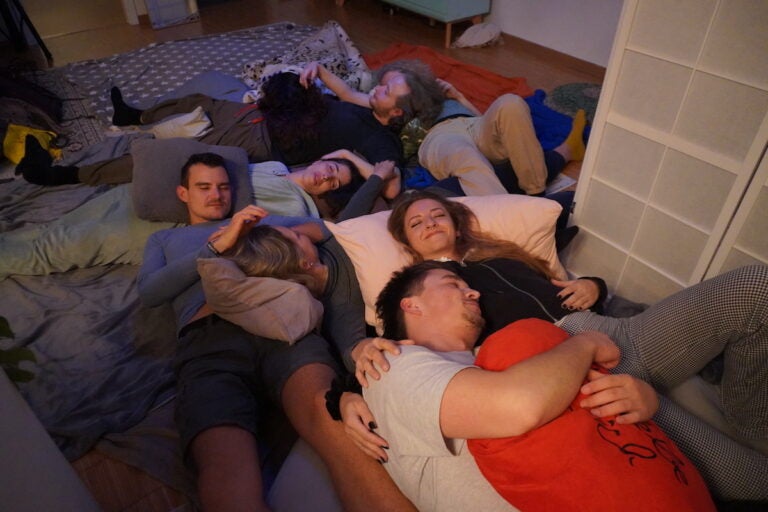‘Cuddle Parties’ serve as an antidote for loneliness and lack of touch
Touch is a human need, but many people report they are not getting enough touch in their lives. ‘Cuddle parties’ aim to provide a safe space for touch and connection.
Listen 11:33
The MUSH, an organization in Berlin, Germany, organizes cuddle parties to combat a lack of touch in people's lives. (Charlie Garcia/ For WHYY)
This story is from The Pulse, a weekly health and science podcast. Subscribe on Apple Podcasts, Spotify, or wherever you get your podcasts.
Find our full episode on loneliness here.
Marion, a mother of three living in Berlin, remembers growing up in a household full of touch and affection.
But as an adult, married to a partner who wasn’t as physically expressive, she started to feel something was missing. Especially during and after the pandemic.
“I somehow felt hungry,” she says. “Hungry for touch.”
Then she heard about cuddle parties. At first, it felt too far outside her comfort zone. (We’re only using her first name to protect her privacy.) But after talking with her husband, she decided to try one.
“I think it was just the heart over the head,” she says. “[My] head had a thousand cons, but my heart said ‘yes.’”
After talking with Marion, I decided to try a cuddle party myself. And this is how I arrived at The MUSH, a group in Berlin that organizes their own cuddle parties.
The MUSH
I arrived at the apartment and found about a dozen others. The vibe was friendly and relaxed. We hung out in the kitchen, chatting and sharing snacks, before moving into the living room, where the floor was covered in blankets and pillows.
The evening began with consent exercises led by facilitator Paddy Martinkewitz. We practiced saying “no.” We practiced receiving “no.” We learned to read signals, check in with our bodies, and listen.
“The celebration of the “no” is a foundational concept,” says David Rhein, the founder of MUSH.
Rhein is a dance teacher, and he kept noticing that after his classes, many of the dancers would end up touching and cuddling. He saw that there was a real need for safe spaces of physical connection, so he created The MUSH to fill that void.
Touch Hunger
For humans, touch is more than a gesture. It’s a biological and emotional necessity. But in today’s fast-paced digital world, many of us are not getting the touch we want or need.
“[Touch] is one of these senses that’s with us from birth — right until to the very end,” says Michael Banissy, head of psychological science at the University of Bristol and author of “When We Touch.”
“It’s one of the first that develops — one of the last that goes.”
Subscribe to The Pulse
Banissy studies how humans form and maintain social connections, and how those connections impact our health, happiness, and well-being. Touch, he says, plays a critical role in all of it.
Research shows that physical contact regulates our nervous systems, calms stress, and strengthens our sense of connection. It boosts feel-good hormones like oxytocin and dopamine, while lowering cortisol, the hormone that fuels anxiety and tension.
“If people hug before a stressful event, this would mean that during the stressful event, you see a modulation of cortisol,” said Banissy.
Touch also improves immune function.
One study tracked how often participants hugged over a two-week period, then exposed them to a common cold virus. Those who had received more hugs were significantly less likely to get sick.
And, when people don’t get enough touch?
Banissy says people experience, “poorer kind of mental health, higher anxiety, higher depression, people typically report lower wellbeing, and higher loneliness.”
In 2020, he led one of the largest global studies on human touch in collaboration with the BBC and The Wellcome Collection. Nearly 40,000 people from 112 countries took part.
Around 45 percent of people said they weren’t getting enough touch in their lives. And the biggest reason they gave for not engaging more? Consent. They weren’t sure when or how it was welcome.
The study launched just before the COVID-19 pandemic transformed the world, but the results came in early enough to offer a snapshot of how people were already navigating connection and where they felt the most disconnected.
As lockdowns spread, Banissy began to feel the effects himself.
“I’m a touch scientist, I’ve known for years the literature about the importance of touch. but it really probably wasn’t until the pandemic hit that I was like, okay, I really do miss touch in my life because all of a sudden, I couldn’t hug my family. I couldn’t do all these things that I just took for granted.”
As millions of people suddenly went without the touch, they once took for granted, a new term emerged: touch hunger. And for some, it never fully went away.
Embracing touch
Many guests at MUSH come after a breakup or long stretches of loneliness. Others work remotely and miss the casual contact of office life. One woman I spoke with said she gets plenty of touch as a mom, but always from a place of giving, never receiving.
The most common reason people gave for attending was the desire for a clearly platonic space where they could give and receive affection through touch without it being mistaken for something sexual or having to question the intentions behind it.
“Our intention is to explore intimacy and connection,” says Rhein. “You have to agree before you even come into the room that you’re not coming with sexual intention.”
There is no easy way to fill the void of physical contact in modern life. The way we’ve built our fast-paced, digital world makes it hard for many of us to get even our most basic touch needs met. Cuddle parties may not be for everyone, but I do think that embracing a culture of touch positivity and learning to express our boundaries and needs could be one step toward a more connected, touch-friendly world.
WHYY is your source for fact-based, in-depth journalism and information. As a nonprofit organization, we rely on financial support from readers like you. Please give today.






